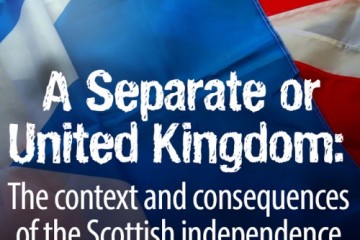
On Devolution: England should get what England wants – it’s time to find out what that is
‘You can be proud to be English and British’, Labour party leader Ed Miliband told his party conference. Yet the Labour leader ducked the question of England’s place within the next stage of devolution, instead warning that Prime Minister David Cameron’s raising of the issue of ‘English votes for English laws’ could divide the UK.
Labour’s complaint – that the Prime Minister’s raising the question of English votes for English laws was simply a partisan ambush – is unconvincing, because it fails to answer the key questions.
Any party which wants to be part of the conversation needs to decide what it is offering to England and the English.

The British constitutional reform crisis: a proposal
The UK needs a framework for federalisation. Here’s one suggestion for how this could work. The Problem Britain is on the brink of a catastrophe of which the left seems to be frighteningly unconcerned and unaware. If the Conservatives succeed in implementing English-only days at Westminster, it is likely to transform both Scotland and the rest of the UK into what will in effect be neoliberal dictatorships. Scotland will lose the ability to vote down proposals that would lead to steep cuts in its budget via Barnett consequentials if key services are privatised south of the border. English voters who may have voted Conservative or UKIP for ‘protest’ reasons such as concern about immigration or dislike of the EU could …

So what is a people’s constitutional convention?
Over the past couple of weeks, as the referendum campaign reached its climax in Scotland, a concept has suddenly started springing up all over the place in English political debate: the idea of a constitutional convention. (The Welsh National Assembly called for UK-wide constitutional convention in 2012.) In a letter to The Times on September 10, 19 experts on UK democracy set the proposal out as follows: ‘It is time for a UK-wide constitutional convention, on the lines of recent conventions in Ireland and Iceland, that gives citizens a say in shaping the future. Such a process needs the support of all the political parties, but it must retain its independence from them.’ Calls, similar in content or spirit, have come from Nick Pearce of IPPR,Compass, Rebecca Johnson …

Our series on the Scottish referendum: things to keep in mind for tomorrow
In advance of the vote tomorrow, which will decide the fate of the three-centuries-old voluntary union between Scotland and England, the outcome is far from a foregone conclusion. The Politics in Spires blog series ‘A Separate or United Kingdom’ has attempted to contribute to an expanded discussion of the independence debate with voices from across the social sciences, including law, economics, sociology, psychology, human geography, political philosophy, and more. Much of the popular discussion has centred on the fiscal and economic consequences of separation. Prof Simon Wren-Lewis agrees with the UK Treasury that in the next decade, at least, Scottish people ‘will be significantly better off by staying in the Union’. Wren-Lewis warns that independence would involve high set-up costs which would …

Scotland: whoever wins, the public loses
The result of the referendum on 18 September is very uncertain, but its effects have already been felt. Whichever side wins, and whichever path the Scottish people chooses, the real loser of the long referendum campaign has been the quality of public debate, both in Scotland and south of the border. This is not meant as a trivial slight at any irrationality on the part of Scottish voters, or excessive rambunctiousness in the public demeanour of partisans of ‘Yes Scotland’ or ‘Better Together’. If anything, it is to be applauded that the debate has galvanised such high levels of engagement among the Scottish public, culminating in an expected turnout for the referendum of as much as 80%. Instead, it is more a comment that in the supposed contest between ‘head’ and ‘heart’ reasons for which way to vote, it has generally been the very worst aspects of both that have prevailed over their better, and more useful, fellow-arguments. The debate over Scotland’s future has, especially recently, served up the incongruous (and unromantic) image of a nation of ‘bean-counters’ basing its decision about independence on the expected profitability of either outcome, yet calculating this expectation (on either side) off the back of political and economic assumptions that resemble nothing so much as declarations of blind fear or faith.

(Under)taxation of North Sea Oil and Gas Production and its Implications for Scottish Independence
The Guardian newspaper recently published an article by Aditya Chakrabortty entitled ‘Dude, where’s my North Sea oil money?’ (13 January 2014), which drew a comparison between Norway and the UK in terms of what approximately four decades’ worth of fiscal income from oil and gas production has meant for each country. The main thrust of the article was to suggest that the reason why the UK does not have a colossal nest egg like Norway’s is that the UK government effectively squandered its windfall in tax breaks. That is true, but not in the way Chakrabortty thinks.
Starting in 1981, once the Falklands conflict (and the need to pay for it) was over, the UK government led by Margaret Thatcher embarked on a process (which accelerated greatly under John Major and even more so under the Blair-Brown Labour governments) of levying progressively less and less taxes on oil and gas exploration and production activities. In other words, Chakrabortty is right in saying that most of the windfall was squandered in tax breaks but, overwhelmingly, the main recipient of these tax breaks was the UK oil and gas industry. As oil prices have skyrocketed from 2000 onwards, the differences in the amounts that the UK levies compared to other large North Sea producers (and not only Norway) have reached astonishing proportions.

What happens to Scotland’s Westminster MPs after a ‘yes’ vote?
On 25 March this year, a bill disenfranchising around 4 million people was introduced to Parliament. It barely received any press coverage, and though it was defeated it raised an important and oddly neglected constitutional question.
The bill in question was proposed by Tory John Stevenson, and asked “that leave be given to bring in a Bill to amend the Representation of the People Act 1983 to disenfranchise all residents of Scotland eligible to vote in any United Kingdom General Election held after 18 September 2014 in the event of a positive vote in the Scottish Independence referendum; and for connected purposes.”[1] It attempts to solve an anomaly caused by the electoral calendar: Scotland votes on independence on 18 September this year, but would only become an independent nation some time in 2016 (the Scottish government is planning for 24 March[2]). In between those two dates, of course, the UK will hold a general election. Some Conservatives argue that Scots shouldn’t return MPs to Westminster in 2015 because most laws passed by the 2015 Parliament will not apply to Scotland. The problem is exacerbated by the Labour Party’s dominance in Scottish constituencies: 2015 could well see a Labour majority in Westminster and a Conservative majority in ‘rump UK’, i.e. the United Kingdom minus Scotland. In this situation – one of the most likely outcomes of the general election – by whom would Britain be governed?

Personality Prevails: A political psychology perspective on the Scottish independence referendum
As the Scottish independence referendum campaign enters its final stages, both sides will still be hoping that they can persuade as many voters as possible that their side is right. Although undoubtedly some voters are still to decide which way they will vote, the minds of most voters were made up long ago and the campaign will have made little difference. Political psychologists have convincingly shown that voters aren’t particularly good at making objective assessments of arguments about political issues – regardless of their actual validity, we tend to think that arguments that support our positions are good and arguments that don’t are bad. Even when voters have the same factual information, partisan bias leads to very different conclusions. The stability of the referendum polls despite the long and intense campaign suggests that these factors are almost certainly playing an important role in opinions on the independence debate.
If vote intentions in the referendum aren’t a result of objective evaluations of the pros and cons of Scottish independence, where do these opinions come from? Political attitudes are not simply created in a vacuum, nor do they just reflect self-interest according to socio-economic position. Scholars have long suspected that political attitudes arise from deep-seated psychological dispositions – particularly from differences in personality. For psychologists, ‘personality’ captures the patterns of thought, feeling, and behaviour that are relatively stable within individuals in different situations and across time: people who are organised at work are also likely to be organised at home; shy children often grow up to be shy adults. For the past few decades, the leading paradigm in personality psychology has been the ‘Big Five’ approach, which has shown that much of the variation in personality traits between people can be captured by five dimensions – agreeableness, conscientiousness, emotional stability (sometimes labelled ‘neuroticism’), extraversion, and openness to experience.









